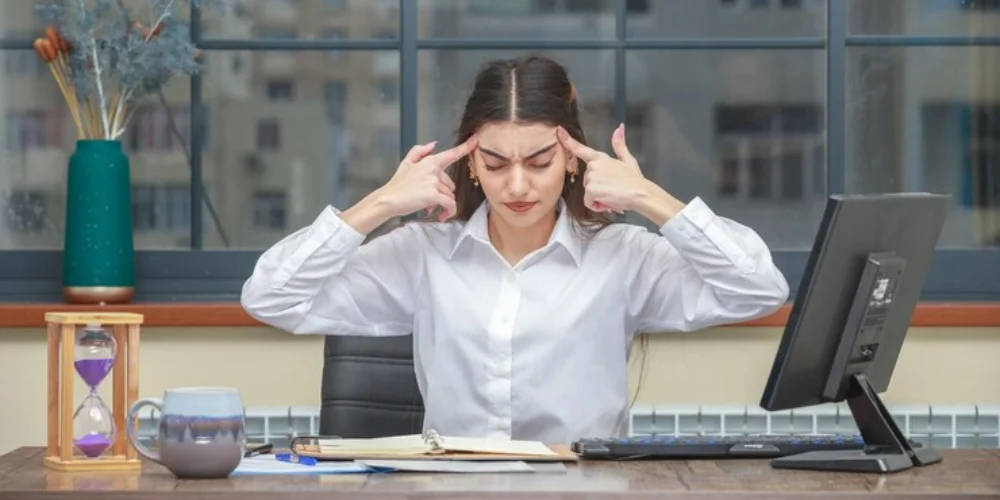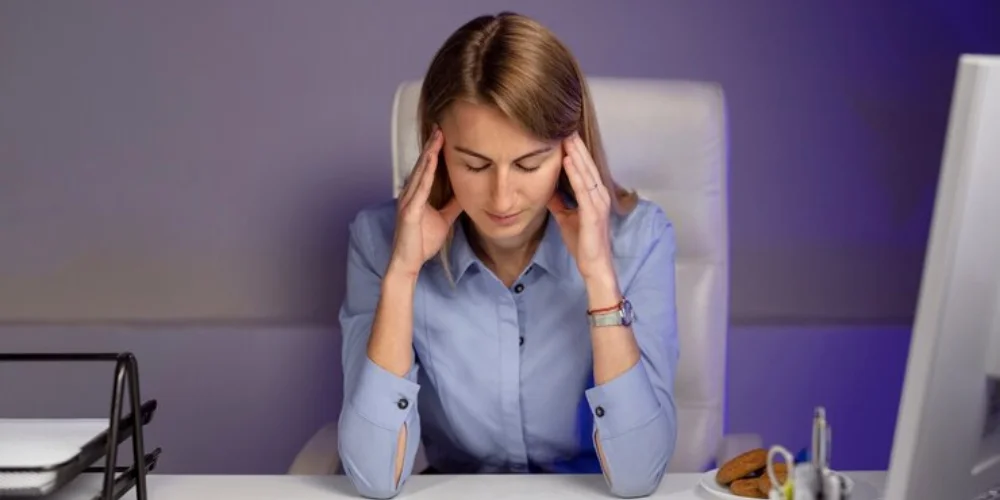Stress Management Tips and Tricks | 100% Best Solutions of Stress
In today’s fast-paced world, Stress is a common issue affecting millions. Work, relationships, or daily challenges can impact mental and physical health. Managing Stress effectively is critical for supporting general well-being. This comprehensive guide provides 100% of the best solutions for Stress through various stress management techniques that are highly effective and easy to implement
1: Understanding Stress: What It Is and How It Affects You
Anxiety is the body’s reaction to any request or challenge. When faced with a threat, the body triggers a ‘fight-or-flight’ response, releasing hormones like adrenaline and cortisol. While occasional Stress occurs daily, chronic Stress can have serious health consequences.
Common Effects of Stress:
- Physical Effects: Headaches, muscle tension, fatigue, high blood pressure, digestive issues.
- Emotional Effects: Anxiety, depression, irritability, mood swings.
- Behavioral Effects: Gluttony, under-eating, abuse of importance, and social escape.
Understanding how Stress manifests is the first step toward effective stress management.

2: The Importance of Managing Stress Effectively
Effective stress management is essential for several reasons:
- Prevents Health Issues: Prolonged Stress can lead to severe health conditions such as heart disease, diabetes, and mental health disorders.
- Improves Quality of Life: Reducing Stress enhances overall well-being, improves sleep, and boosts mood and energy levels.
- Enhances Productivity: Lower stress levels improve focus, concentration, and decision-making skills, leading to higher productivity.
3: Top Stress Management Techniques
Managing Stress involves using a combination of techniques that work best for you. Here are some top stress management strategies:
- Mindfulness Meditation for Stress Relief: Mindfulness meditation focuses on the present moment without judgment. This technique helps reduce negative thoughts and promotes relaxation, making it one of the most effective stress management methods.
- Yoga for Stress Relief: Yoga combines physical postures, breathing exercises, and meditation to promote relaxation and restlessness. Regular practice improves physical fitness and enhances mental clarity and emotional balance.
- Deep Breathing for Stress Relief: Deep breathing exercises, such as diaphragmatic breathing or the 4-7-8 technique, help calm the nervous system. Regular practice can reduce restlessness and improve overall health.
- Exercise for Stress Management: Physical activity releases endorphins, the body’s natural stress relievers. Walking, running, or swimming can significantly reduce Stress and boost mood.
- Progressive Muscle Relaxation (PMR) involves pulling and relaxing various muscle packs. This process helps remove physical tension and enables relaxation.

4: Quick Stress Relief Tips for Immediate Results
Sometimes, you need to restlessness quickly. Here are some quick stress solace tips:
- Practice Deep Breathing: Take sluggish, serious breaths to relax your mind and body.
- Take a Short Walk: A brief walk outside can clear your mind and improve your mood.
- Listen to Calming Music: Music can significantly affect air and pressure levels.
- Use Aromatherapy: Essential oils like lavender or chamomile can help with restlessness and promote relaxation.
- Perform a Quick Stretch: Stretching can relieve muscle tension, improve blood flow, and reduce Stress.
5: Long-Term Stress Management Strategies
For long-term stress relief, consider these strategies:
- Develop Healthy Habits. These include frequent exercise, a level diet, and good sleep. These habits are fundamental for managing Stress.
- Practice Gratitude. Keeping a gratitude journal can help you shift your focus away from Stress and toward the positive aspects of your life.
- Stay Connected: Hold social relationships with friends and relatives. Talking about stresslessness with a trusted person can provide relief and support.
- Time Management: Organize your tasks and prioritize them effectively. Managing your time can restlessness and prevent burnout.
6: Stress Management for Specific Situations
Different situations require different approaches to stress management:
- Stress Management for Professionals: Workplace stress is a common issue. Here’s how to manage it:
- Prioritize Tasks: Break down your tasks into manageable parts and focus on one at a time.
- Set Boundaries: Learn to say no and set boundaries to avoid taking on too much.
- Take Breaks: Regular breaks can help you stay focused and restlessness.
- Stress Management for Students: Academic pressures can be overwhelming for students. Here are some tips:
- Create a Study Schedule: Plan your study time and include breaks to avoid burnout.
- Practice Relaxation Techniques: Deep breathing and mindfulness can help with restlessness.
- Stay Active: Physical activity can help with Stress and improve concentration.
- Stress Management During Pregnancy: Pregnancy can be stressful for many women. Here are some ways to manStressress:
- Gentle Exercise: Engage in light exercises like prenatal yoga or walking.
- Adequate Rest: Provide you with sufficient sleep and rest throughout the day.
- Healthy Diet: A balanced diet rich in vitamins and minerals can support physical and emotional health during pregnancy.

7: Natural Stress Relief Methods
For those looking for natural ways to manStressress, consider the following:
- Aromatherapy: Essential oils like lavender, chamomile, and eucalyptus can promote relaxation and restlessness. These oils can be diffused in the air, added to a bath, or used in massage oils.
- Herbal Supplements: Certain herbs, such as ashwagandha, valerian root, and chamomile, are known for their stress-relieving properties. These supplements can be taken in capsule form, as a tea, or as a tincture. Permanently consult a healthcare provider before beginning any new complement regimen.
- Acupuncture: This traditional Chinese medicine technique involves inserting thin needles into specific points on the body to balance the body’s energy flow, known as qi. Acupuncture can help alleviate Stress, anxiety, and pain.
- Biofeedback: Biofeedback is a process that guides you through controlling physiological processes such as heart rate and muscle tension. This method can help you learn to relax and manage Stress more effectively.
8: Advanced Stress Relief Techniques and Therapy Options
For those examining for avant techniques, here are some options:
- Cognitive Behavioral Therapy (CBT) is a type of psychotherapy that helps individuals recognize and change negative thought patterns contributing to Stress. By reframing thoughts and adopting more positive behaviors, CBT can effectively manage Stress and anxiety.
- Mindfulness-Based Stress Reduction (MBSR): MBSR combines mindfulness meditation and yoga to help individuals become more aware of their thoughts, feelings, and bodily sensations. This awareness can help with Stress and improve emotional regulation.
- Stress Inoculation Training (SIT): SIT is a form of cognitive-behavioral therapy that helps individuals prepare for and cope with stressful situations by developing resilience and coping skills.
- Neurofeedback Therapy: This advanced therapy uses real-time monitoring of brain activity to help individuals learn to control and improve their mental states, effectively reducing Stress and anxiety.

9: Innovative Stress Relief Products and Tools
Investing in stress relief products can also help Stress effectively:
- Weighted Blankets: These blankets provide deep pressure stimulation, which can help reduce anxiety and improve sleep quality.
- Stress Balls and Fidget Toys: These products provide a physical outlet for Stress and can help improve focus and concentration.
- Relaxation Apps: Mobile apps offering guided meditation, breathing exercises, and calming sounds can be a convenient tool for stress management.
10: Lifestyle Changes to Red Stresses
Making positive lifestyle changes can significantly reduce stress levels:
- Healthy Eating: A balanced diet of fruits, vegetables, whole grains, and lean proteins can support overall health and stress management.
- Regular Exercise: Incorporating regular physical activity into your routine can help stress and improve mood.
- Adequate Sleep: Prioritizing sleep and establishing a regular sleep schedule is essential for managing Stress effectively.
11: Stress Management for Different Populations
Stress affects different people in different ways. Here’s how to manStressress effectively for different populations:
- Teens: Encourage teens to engage in physical activities, maintain a healthy sleep schedule, and practice mindfulness techniques to manage Stress.
- Seniors: Older adults may experience Stress related to health, mobility, or loneliness. Elders can benefit from social attention, soft exercises, and peace techniques such as reflection or deep breathing.
- Athletes: Athletes often face physical and mental Stress related to training and competition. Techniques such as visualization, progressive muscle relaxation, and a balanced diet can help manStressress for athletes.

Conclusion
ManagStressress effectively requires combining techniques and strategies tailored to individual needs. Incorporating the best stress management practices into your daily routine can reduce Stress, improve your overall health, and enhance your quality of life. Remember, the key to managing Stress is finding what works best for you and making it a regular part of your routine. Embrace these techniques, make lifestyle changes, and seek professional help to lead a stress-free and fulfilling life.
Recent Post
-
 Top 20 Tips to Improve Your Sleep When Times Are Tough
Top 20 Tips to Improve Your Sleep When Times Are Tough -
 Boost Your Mental Health with Mindfulness and Meditation Practices | Tips 2024
Boost Your Mental Health with Mindfulness and Meditation Practices | Tips 2024 -
 Stress Management Tips and Tricks | 100% Best Solutions of Stress
Stress Management Tips and Tricks | 100% Best Solutions of Stress -
 Depression and Anxiety | 10 Best Treatments for Depression & Anxiety
Depression and Anxiety | 10 Best Treatments for Depression & Anxiety -
 Weight Lose Fast: Scientific and Sustainable Lose Weight Top 15 Tips
Weight Lose Fast: Scientific and Sustainable Lose Weight Top 15 Tips -
 Transform Your Health with Expert Nutrition & Diet Tips
Transform Your Health with Expert Nutrition & Diet Tips -
 #1 Natural and Medical Treatments for Sleep Disorders: A Complete Guide
#1 Natural and Medical Treatments for Sleep Disorders: A Complete Guide -
 #1 Enhance Your Energy with These Exercise and Fitness Tips
#1 Enhance Your Energy with These Exercise and Fitness Tips -
 Choosing Why Sleep Is Important for Cognitive Health
Choosing Why Sleep Is Important for Cognitive Health -
 Tips for Improving Mental Health and Well-being
Tips for Improving Mental Health and Well-being -
 How to Improve Your Physical Health for Overall Wellbeing
How to Improve Your Physical Health for Overall Wellbeing
